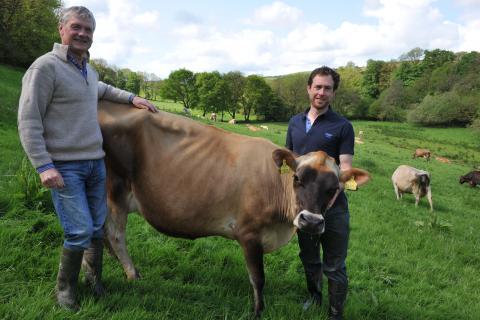A new entrant dairy farmer who is converting his system to organic is tapping into the knowledge and expertise of a milk producer who started his own business from scratch 20 years ago.
Michael Houlden runs a herd of 56 Jerseys and followers near St Clears, Carmarthenshire, on a 42 hectare (105 acre) farm he bought in 2012.
The economic challenges of producing conventional milk from a small herd encouraged him to consider ways of differentiating his milk to achieve a better margin. Converting to organic offered an opportunity to add value but making the leap was daunting, until he teamed up with an experienced organic dairy farmer.
Haydn Evans, a former bank manager who set up his own organic dairy business after leaving the banking sector, is one of 28 mentors providing guidance and advice through the Farming Connect mentoring programme.
Michael applied to be mentored by Haydn because of his experience in the organic milk sector – he milks 100 British Friesian cows on a 97 hectare farm, also in Carmarthenshire.
With Haydn’s guidance, Michael aims to have fully converted the farm by September 2018.
Michael is a first generation farmer who started with a small flock of sheep in Somerset after gaining a Certificate of Higher Education in Agricultural Management. He built the flock up to 320 breeding ewes but his system relied heavily on rented ground.
His dream was to establish a dairy herd on a ring-fenced farm. That opportunity came when Plas-y-Cerdin came on the market.
He stocked the farm with Jersey cows and has been focusing on producing milk with high constituent values – butterfat is averaging 5.95% and protein 3.95%. Average yield per cow is 4,900 litres, which is achieved from one tonne of concentrates. “With Jerseys its all about quality, not quantity,’’ says Michael. Somatic cell count is 179,000 cells/100ml and Bactoscan 27.
Michael first considered organic conversion two years ago but admits the farm wasn’t ready at that time and neither was he. “One of the things that was holding me back from converting was the lack of nutrients in the soil. The farm had been used for growing silage for years, there were no livestock here. I needed to get the soils alive again.’’ He embarked on a programme of reseeding with clover mixes.
He recently took on an adjoining block of 22 hectares on a Farm Business Tenancy and that was the trigger to taking a fresh look at converting.
With Haydn’s support, he is now ready to start that process and to grow the herd to a target of 80 cows. “The organic market is tight and the grant system is structured in a way that you have to demonstrate that there is a demand and a reason for going organic. But there are opportunities if the system is right,’’ says Michael.
Haydn has brought an outside perspective to Michael’s plans and has both challenged and encouraged his ideas. “Haydn is someone who has been there and done it so to draw from that experience has been extremely valuable. He is someone I can bounce ideas off. He has also arranged for us to visit organic dairy farms to look at what they are doing.’’
Haydn says it is important for all farmers, but in particular those starting out, to have their thinking challenged to ensure that their ideas are sufficiently robust to succeed commercially.
“Enthusiasm is critical but it is no guarantee of success. Every farmer needs a business plan of what they want to achieve and to then invite someone to challenge it. If you have an outsider looking into your business that person may see the problems and opportunities that aren’t always apparent to the farmer.’’
Under the mentoring scheme, Haydn will support Michael at monthly meetings for 18 months.
Michael is confident that organic conversion is the right move for his business. “You have to believe in organic, there has to be a certain passion rather than doing it purely for economic gain. For me, it is about sustainability of production, to keep as much in-house as possible.’’
One cost-saving measure he has already put in place is 16-hour milking intervals - milking three times in two days. This has had little impact on yield – from 42 milkers the daily production was reduced by only 30 litres. By milking less frequently he is making savings on labour and electricity. “It’s not as drastic as milking once a day, it doesn’t seem to upset the cows,’’ he says.
Under the Farming Connect Mentoring Programme, eligible mentees can access 22.5 hours of fully funded mentoring services with their chosen farming or forestry mentor.
Einir Haf Davies, Farming Connect Development and Mentoring Manager, says mentors have ‘been there, done that’ and can develop relationships based on mutual trust and respect.
“It's an opportunity for farmers and foresters to develop communication skills, to listen, learn and expand their viewpoints which in turn may help them to find new ways to approach new situations and deal with challenges,’’ she says.
Farming Connect have a network of 40 mentors, covering a variety of sectors across the whole of Wales. For more information on the programme and to select a mentor visit https://businesswales.gov.wales/farmingconnect/mentoring.

